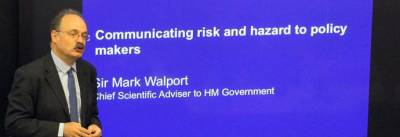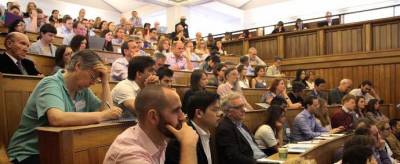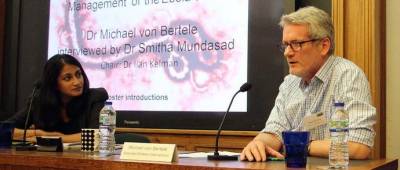IRDR 5th Annual Conference Report
29 July 2015
The UCL IRDR Fifth Annual Conference marked five years since the launch of the Institute, and another year of sustained growth where we have continued to move from strength to strength.
 Highlights of the last year can be seen in our Annual Report.
Highlights of the last year can be seen in our Annual Report.
Our Fifth Annual Conference covered the topics of Arctic Risks, a thriving research area for UCL IRDR; Visualisation of Hazard and Risk, an important aspect of many IRDR activities; Communicating Hazard and Risk to Policy Makers, an area that we are working with UCL Public Policy to address; Management of the Ebola Crisis, an issue that we address in collaboration with our colleagues in UCL Institute for Global Health; and Calculating, Portraying, Understanding and Reducing Risk, as a broad topic for our poster session to showcase the breadth of research we undertake and to attract a wide range of external submissions.
Attendance at this conference was higher than ever, with over 160 attendees. There was plenty of interest and engagement in the topics covered at the conference, with lively audience discussion in the lecture theatre and at the poster session, and even beyond the audience on social media. Summaries and audio recordings of each session are detailed below.
Panel Discussion on Arctic Risks
By Ben Lishman, UCL IRDR Research Fellow and Session Chair
The IRDR panel discussion on 'The Future of Arctic Risks' featured Tim Stockings (operations director of the British Antarctic Survey), Jill Barrett (British Institute of International and Comparative Law), Ed Heartney (US Embassy) and Tim Reilly (Arctic Advisory Group). The session also featured an introduction from Julian Hunt (Baron Hunt of Chesterton) summarising the recent House of Lords' Arctic report.
The discussion made clear that to understand the Arctic we need to consider not just technical information, but also legal and geopolitical frameworks, social contexts, economic incentives, and historical trends. The Arctic is important as an indicator for climate change, as an area where people live and work, as a strategic geopolitical frontier, and as a centre of new science. The discussion of risks encompassed potential specific scenarios - ships sinking, oil spills - alongside long-term risks, such as a loss of stability of the Arctic Council, and the potential for international tensions to be played out in the Arctic.
Climate change was central to the discussion. Ed Heartney noted the dramatic reduction in multi-year sea ice, and discussed strategies for both mitigation and adaptation in the Arctic. Julian Hunt's discussion of the climatic effects of melting permafrost sparked a discussion on Twitter across the UCL community. Tim Stockings noted the success of the Montreal Protocol, and the UK's involvement in protecting the ozone layer, which serves as a reminder that international agreement can be successful.
Audience questions encompassed the future of the Arctic council (in particular whether it can maintain its consensus-driven strategy); the importance of climate change in the Arctic and the symbolism associated with drilling, or not; the limits of search and rescue, and hence operational safety, in the Arctic; the effects of Russian sanctions on the Arctic; and the benefits of expanding the Arctic council's membership.
We're grateful to all participants for helping to show the complexity involved in understanding the far north, and stimulating discussion on immediate and future risks in the Arctic. See below a recording of the full panel discussion.
If the embedded player above does not work, please use this link to access the Arctic Panel discussion on an external page.

Keynote address on Communicating Hazard and Risk to Policy Makers by Prof Sir Mark Walport, Government Chief Scientific Advisor
Summarised by Rosanna Smith, UCL IRDR Deputy Director and session chair
In his keynote address, Sir Mark presented practical advice on how to provide scientific advice to policy makers, an insight into his role as Government Chief Scientific Advisor, and some examples of how scientific advice on risk and hazard has been used by policy makers. He highlighted that when policy makers seek scientific advice, this is part of a range of factors that they consider in their decision making process. As such, they may well value and believe the scientific advice they receive, yet appear to act against it because other factors, such as public opinion and values, pull them in another direction. On the topic of values, he advocated that scientific advisors should ensure that their advice remains scientific and does not extend to personal values. Sometimes scientists struggle to effectively differentiate when their values are science driven. Similarly, we should be ready to point out when arguments against scientific evidence are values arguments that do not challenge the science. These values arguments are still important to policy makers, but as scientists we should help policy makers to discern which arguments are scientific.
Within the area of risk and hazard, Sir Mark proposed that those offering advice should try to be clear on the distinction between hazard and risk, and to keep in mind that people will engage more easily with advice that is framed positively. He highlighted the success stories of scientific advice helping the government to deal with the Icelandic ash cloud in 2010 and the British response to Fukushima in 2011, as well as the willingness of experts to respond when advice is needed urgently in times of crisis. A longer report of this Keynote address can be found in the UCL events blog, and a full recording is below.
You can also access the Keynote address recording on this link to an external page

Visualisation of Hazard and Risks
By Joanna Faure Walker, UCL IRDR Lecturer and session chair
Visualisation of Hazards and Risks session comprised of four talks. In the morning, Tobias Stuart (Graphic) gave a mini masterclass on how to tell stories through graphics, using examples to show how to best portray our messages. He brought in examples from politics and analysing music history to provide inspiration of different ways that those in the field of hazard and risk can better display our data to wider audiences. Vanessa Banks (BGS), Richard Wall (UCL Hazard Centre) and Richard Teeuw (University of Portsmouth) gave afternoon presentations on projects they have been involved with showing how their teams have used different tools to display hazard, risk and uncertainty data in order to trigger action. The session provided both inspiration and practical advice for how we may approach the problem of displaying complex, impartial data, while emphasising key messages to a variety of audiences.
You can also access Tobias Sturt's talk on this link to an external page
Audio link Part 2: Vanessa Banks, Richard Wall, and Richard Teeuw

In Conversation on managing the set up of an Ebola treatment centre
By Dr Ilan Kelman, Reader in UCL IRDR and UCL IGH, and session chair
The 'In Conversation' session featured Smitha Mundasad (BBC) interviewing Michael von Bertele (Humanitarian Director of Save the Children International) on 'Management of the Ebola Crisis', although both were representing themselves not their organisations. Smitha's questions were insightful, pertinent, and direct, drawing out from Michael the story of him setting up a centre to care for those with Ebola in West Africa. The challenges and the successes, the politics and the medicine, were enveloped within the wider human story; of people dying from Ebola, their families, and the courage of local and non-local medical staff tasked with the day-to-day (and all-night) operations. The interview provided a vivid and inspiring picture of how a humanitarian worker must think and act in crisis, with humour that did not denigrate those who suffered or helped alleviate suffering, alongside the dignity of human beings trapped in a horrendous life-or-death situation. A full recording of this in Conversation session is below.
You can also access this in Conversation recording on this link to an external page
Poster session on Calculating. Portraying, Understanding and Reducing Risk
Chaired by Dr Gordon Ross, Lecturer in UCL IRDR and Statistical Sciences
The conference concluded with a poster session on 'Calculating, Portraying, Understanding and Reducing Risk'. In this session, many research students and research staff from the IRDR presented their latest research, in addition to submissions from external researchers.
A full abstract list can be downloaded here (pdf).
Our annual conference sparked lots of commentary and conversation on Twitter, see excerpts below or look up #IRDR5th on Twitter
Another fascinating thread to follow today via #IRDR5th on Future of #Arctic Risks via @UCLIRDR
— Antarctic Survey (@BAS_News) June 25, 2015
Sir Walport #irdr5th: make your policy point simpler. If the size of Dickens, policymakers aren't going to read, let alone understand
— Lauren Traczykowski (@ltraczy) June 25, 2015
A good and interesting testimony of the management of the Ebola Crisis #IRDR5Th @UCLIRDR #UCL
— John (@Erretega) June 25, 2015
Had an informative day yesterday @UCLIRDR, learning about Arctic risks, better ways to communicate visually and the Ebola crisis. #IRDR5th
— Danielle Charlton (@hazardgirl09) June 26, 2015
Very valid points about the usefulness of community collected data in assessing vulnerability to hazards. @UCLIRDR @RickJohnWall #IRDR5th
— Grace Whitby (@gracewhitby) June 25, 2015
 Close
Close






